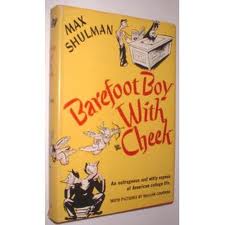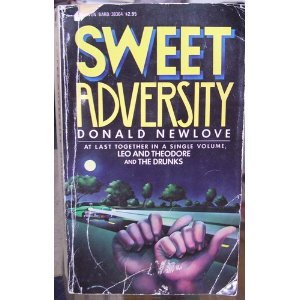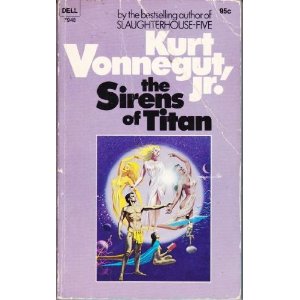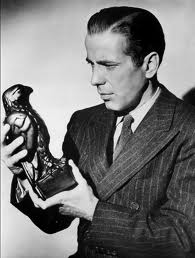
Broderick Crawford as populist pol Willie Stark in Robert Penn Warren’s All The King’s Men – Law&Liberty.org
Of 10 American novels critic Terry Teachout posted yesterday that he wishes he’d written, only All The King’s Men by Robert Penn Warren similarly appeals to me. I can imagine hunkering down as Penn Warren did, dryly but fiercely etching the sickness of American populist politics, which we’re seeing swirl at its sickest this very  primary season. It would be work, for sure, but at a white hot energy — which I’d think would be hard to sustain, but so satisfying to bring to completion.
I haven’t read all Terry’s other choices (but of course Gatsby), and as he says his whimsical exercise is based on personal taste. Would it have been fun to write Gatsby? Maybe for F. Scott Fitzgerald, but not for me. I’d rather have dreamed up the terse treachery in Dashiell Hammett’s The Maltese Falcon, the flat-out funny of Max Shulman’s Barefoot Boy With Cheek, the kaleidoscopic enormity of
Pynchon’s Gravity’s Rainbow.
 I’d have enjoyed penning “The Legend of Sleepy Hollow” and “Rip Van Winkle” (not novels, I know, but then neither is “The Tell-Tale Heart”; the three of them together = a novella, so I’ll claim them) and Sirens of Titan and would be proud (of course) to have authored Huck Finn. Tropic of Capricorn is another I could, when I read it, fantasize that someday I might come up with with something like. Octavia Butler’s Wild Seed is excitingly vivid and visionary — just think of spending time conjuring flawed but fantastic immortals in paranormal conflict. Elmore Leonard’s Killshot — Elmore always has fun when he’s writing, you can tell. And maybe Alan Lightman’s Einstein’s Dreams, though I have nothing like the grasp of time and space (physics, right?) I’d have had to have for that.
I’d have enjoyed penning “The Legend of Sleepy Hollow” and “Rip Van Winkle” (not novels, I know, but then neither is “The Tell-Tale Heart”; the three of them together = a novella, so I’ll claim them) and Sirens of Titan and would be proud (of course) to have authored Huck Finn. Tropic of Capricorn is another I could, when I read it, fantasize that someday I might come up with with something like. Octavia Butler’s Wild Seed is excitingly vivid and visionary — just think of spending time conjuring flawed but fantastic immortals in paranormal conflict. Elmore Leonard’s Killshot — Elmore always has fun when he’s writing, you can tell. And maybe Alan Lightman’s Einstein’s Dreams, though I have nothing like the grasp of time and space (physics, right?) I’d have had to have for that.
I admire a gazillion other American novels (and many foreign ones, too), but couldn’t have turned out The Turn of the Screw or Moby Dick or The Scarlet Letter or An American Tragedy or Invisible Man or Miss Lonelyhearts or Donald Newlove’s fantastic Sweet Adversity (much less his latest, Kindle-only, 1000+ page Starlight Photoplays) or Robert Coover’s The Origin of the Brunists or Naked Lunch or even Portnoy’s Complaint — but gee, if I could! Just one of the not-so-simple Dr. Suess classics, W.R. Burnett’s iconic Little Ceasar or James Cain’s Double Idemnity (the Amerian Crime and Punishment) or Christopher Buckley’s The White House Mess or gosh, Carl Haissen’s Tourist Season — sitting at the keyboard, knocking any of those out — that would be a kick. I don’t know if John Burdett’s Bankok trilogy counts as an American novel, exactly, or if Mezz Mezzrow’s Really the Blues is a novel, though it’s ultra-American. Like The Freelance Pallbearers, My Life and Hard Times and (back to Twain) No. 44, The Mysterious Stranger or Algren’s The Devil’s Stocking or The Wizard of Oz. To dwell within such books while they’re unfolding, that must be what novelists live (and die) to do.
1000+ page Starlight Photoplays) or Robert Coover’s The Origin of the Brunists or Naked Lunch or even Portnoy’s Complaint — but gee, if I could! Just one of the not-so-simple Dr. Suess classics, W.R. Burnett’s iconic Little Ceasar or James Cain’s Double Idemnity (the Amerian Crime and Punishment) or Christopher Buckley’s The White House Mess or gosh, Carl Haissen’s Tourist Season — sitting at the keyboard, knocking any of those out — that would be a kick. I don’t know if John Burdett’s Bankok trilogy counts as an American novel, exactly, or if Mezz Mezzrow’s Really the Blues is a novel, though it’s ultra-American. Like The Freelance Pallbearers, My Life and Hard Times and (back to Twain) No. 44, The Mysterious Stranger or Algren’s The Devil’s Stocking or The Wizard of Oz. To dwell within such books while they’re unfolding, that must be what novelists live (and die) to do.
Well, I’m not too shy or superstitious to admit I still harbor novelistic ambitious. I’ve got a complete draft of a fast-paced, hiply talkative crime novel (if anyone’s interested, leave a comment below), notes  for a long work on an underground movement in a dystopian future and a couple old, extremely fanciful chapters of a backwards odyssey in the ’60s, if it had been completely different. I intend to shape all these up, finish them, publish them. True, novels take time, but they make time for the writer and the reader — that suspended bubble of the moments (hours, years) spent writing and reading. I’m sure it’s time well spent, ’cause look at what worlds they depict, so easily accessed and fully inhabited, how wondr’ously eternal yet marvelously new they are every time I open the covers. For sure the kind of novels a person likes –Â loves — say a lot about the person. A poet, not a novelist, said it: “I am large, contain multitudes.” Not to be grandiose –when I feel that way it’s from reading all these novels. . .
for a long work on an underground movement in a dystopian future and a couple old, extremely fanciful chapters of a backwards odyssey in the ’60s, if it had been completely different. I intend to shape all these up, finish them, publish them. True, novels take time, but they make time for the writer and the reader — that suspended bubble of the moments (hours, years) spent writing and reading. I’m sure it’s time well spent, ’cause look at what worlds they depict, so easily accessed and fully inhabited, how wondr’ously eternal yet marvelously new they are every time I open the covers. For sure the kind of novels a person likes –Â loves — say a lot about the person. A poet, not a novelist, said it: “I am large, contain multitudes.” Not to be grandiose –when I feel that way it’s from reading all these novels. . .

